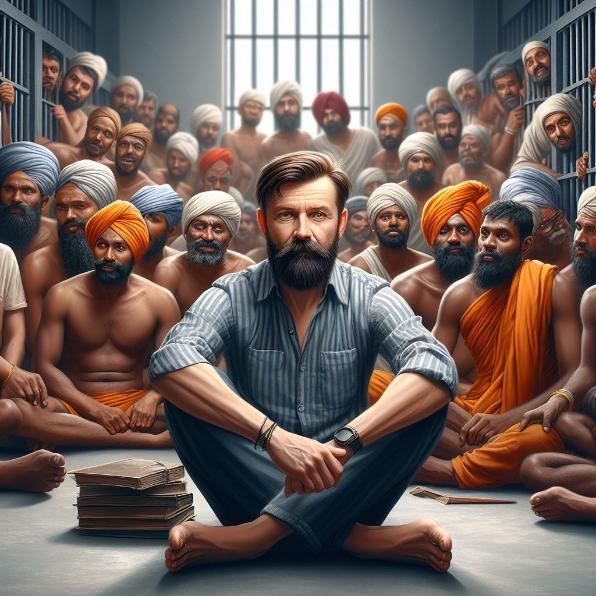It was that other evening in Ziguinchor, Casamance, Senegal. I was in that random hotel’s neat garden, sitting and sipping that Gazelle Senegalese beer I had just ordered. The moment was of a highly exhilarating quality. Some interesting company was the only thing I could wish for to have it elevated to something closer to ideality.
It was that exact moment I heard that wonky door of the room beside my position opening abruptly, whereupon I saw a tall, old white fellow dressed in an Arabic robe coming out of it. His green eyes met mine at the very instant. In them, I discerned a sort of bold defiance against some inner agony that gnawed his soul. Equally bold as his gaze was his gait as he, solidly and unhesitatingly, set off swaggering towards my part. He sat and spoke…
“I must fuck off from here! It’s too hot, and the whole bloody place is full of fucking rubbish. But I’m out of cash. I have some dollars, but the banks won’t open until Monday, and I can find nowhere to change them. Do you maybe have a clue where I could change them today?” he explained his problem in fluent English with a strong Slavic accent.
I advised him to go out and ask at random – in hotels, stores, whomever in the streets – offering a tempting exchange rate. He did that…
He was back in half an hour. He had not managed to change his dollars and uttered a profuse load of curses commenting on the issue. “Have a beer,” I suggested. He followed my suggestion promptly, striding straight to the bar and returning with two Gazelles a few moments later. We spent the rest of the evening there, me endeavoring to extract his peculiar life story and he narrating it eagerly. And here comes a summation of it…
He was born in 1948 in the outskirts of Warsaw and grew up amid the acme of Communist Poland. Since those days of his youth, his whole existence got centered in what was to dominate his entire life thenceforth: women – or, more specifically, the treasure between their legs, in his own words.
“Girls, girls, girls… I had scores of them back then, four at the same time before I left. I had to meet them all every day. I got tired of it. So I think: I will go to the West and see what’s happening over there.”
He managed to get a passport from the Communist administration and left for London, where he sought asylum. He never returned to his homeland until Communism fell. Having stayed in London for a year, he embarked on a ship and reached Australia after a few weeks. There he spent some years working in mines and construction until a friend suggested to him: “Why don’t you go to the psychiatrist and get a leave?”
He visually demonstrated how the conversation with the loony-doc went by, which was not a conversation really, but rather him pronouncing an array of picked-out-at-random words mixed with other freaky noises, and the man on the other side of the desk signing a six-month leave for him.
“I had just found the secret,” he exclaimed enthusiastically. He claimed that he never again worked in his life ever since. But he lived for some three and a half decades on the Australian welfare until he, more recently, got a fat Australian pension.
Saying he didn’t work, however, only stood to mean a lawful, taxed job. He did take up a variety of alternative occupations. One of the most profitable was smuggling gold from Hong Kong to India. He completed quite a few trips successfully until he finally got busted at the New Delhi airport. The customs clerks found 1.5 kg of gold hidden inside his hollow camera, which cost him a six-month imprisonment sentence.
He did not find living conditions in the Indian slammer particularly harsh. He described the Indian prisoners as peaceful dudes. Apart from them, there were also many European and other international prisoners, being there primarily for smuggling as well: gold, heroin, electronics, and pretty much anything that was to be smuggled. An exception to this was the notorious mass murderer Charles Sobhraj (who killed at least a dozen Western tourists in Asia during the 1970s) and stayed in the cell next door. The fact that he had to share a nasty cell with another 70-80 men and manifold as many rats and cockroaches, he did not find pleasant, though tolerable.
When he was released, he found himself in the dreary situation of being an incognito in India. His passport was confiscated and never returned. And on top of that – for a reason I did not quite understand – the Australian embassy in India could not issue him a new passport and exhorted him to cross the border to Nepal clandestinely to get one from the embassy over there. And so he claimed he did together with an East-German bloke who had befound himself in the same situation. They traveled with rickshaws and buses to the border, made it across through the fields in the night, and ultimately ended up with new passports in Kathmandu.
Returning home to Australia after this adventure… that was when he received the hardest blow of his life. A boyfriend had moved into his house together with his wife.
Her cheating on him wasn’t the novel thing; that happened regularly ever since they got married. One time, he said, he busted a lover having entered his house ten seconds after him leaving – when he turned back for the car keys he had forgotten. The novelty now was that he was definitely thrown out of his house and separated from his two daughters. He could do nothing about it. The law constituted an insurmountable barrier between him and his family.
He concluded with a lengthy and fiery speech blaming Australia’s legal system for his predicament and praising some alleged, long-bygone days when he could have slaughtered his wife’s and daughters’ lovers without needing to face any consequences. Even though many years had passed since, the bitterness of the incident was obviously still nestling deep inside his thoughts.
As we kept discussing it, he didn’t seem to grasp my idea: that to marry a hardly adult, fifteen years younger than him, random Filipino girl whom he met in the streets of Manila and could not speak a single word in English, just because she was very pretty, wasn’t quite the right thing to do in the first place. However, he understood rather well by himself and admitted that the family issues they experienced were primarily caused by his faulty behavior. During his married life, he would spend at least ten months of the year traveling around the world, living in brothels in Indonesia and stuff, without ever bothering to give some sign of life back home.
He said he hadn’t slept with a woman for the last four years because he came to despise them after the bad experiences he’d had with them, but one may suspect other reasons of biological nature. From what I understood, however, his emotional needs were as high as ever.
He confessed that he still was in a quest for a wife and soulmate. But he gave me a deriding look when I asked him whether he’s thinking about a Polish woman near his age, for example.
“Are you fucking serious!? Near my age!? I am seventy years old! Seventy-year-old women are ugly… Look at me! I am old! I am ugly too… But at least I can refrain from looking myself in the mirror… her, no!”
He plunged into his thoughts for a bit…
“But you know what… I’m also thinking of another thing: I can buy a caravan in Poland and live there the rest of my life alone… No, I will get two dogs, too… Yes, that’s what I will do… That’s what I must do.”
The story you've just read is a part of my "Real Stories of Real People" collection, wherein I narrate my encounters with various remarkable characters I've run into while traveling around the world. The entire collection is published on my blog and may be read here. But if you'd like to get them with you to the beach in your ebook reader or as a physical book, and very appreciatedly support my creative activity, go ahead and grab your copy from Amazon for the cost of a cup of coffee.

